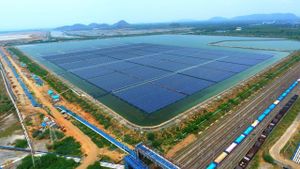The MDC Election 2025 held for the Khasi Hills Autonomous District Council (KHADC) and Jaintia Hills Autonomous District Council (JHADC) has showcased significant shifts within Meghalaya's political framework. With counting commencing on February 24, 2025, the results are drawing considerable attention from analysts and party leaders alike.
Major players such as the National People's Party (NPP), the United Democratic Party (UDP), the Hill State People's Democratic Party (HSPDP), and the newly established Voice of the People Party (VPP) are at the heart of the action. Political observers note the significant turnout during these elections, with approximately 1.3 million voters casting their ballots; KHADC reported 76.77% participation, whereas JHADC saw even higher engagement at 85.58%.
From the outset, the electoral atmosphere was charged. The VPP, led by Bah Ardent M Basaiawmoit, has emerged as a powerful force through its decisive victories, reportedly winning at least 17 constituencies by the time counting began. This new regional party aims to challenge the established dominance of coalition politics long seen within Meghalaya. A VPP spokesperson emphasized their vision, stating, "The people of Meghalaya want change, and we expect to secure an absolute majority in both KHADC and JHADC." This persistence of VPP demonstrates how regional sentiments are adjusting the political calculus within the state.
Initial numbers indicated the VPP's strength, forecasting potentially up to 20 seats, allowing it the opportunity to form the Executive Committee within KHADC. The constituencies where VPP registered victories included Nongkrem, Laitumkhrah, and Mawlai, laying the groundwork for significant political reform as they establish themselves within local governance.
Despite the excitement surrounding the VPP, traditional players like the NPP remain confident about the potential for coalition governance. WR Kharlukhi, the NPP strategist and Rajya Sabha MP, mentioned, "No party is likely to secure an absolute majority, but the MDA combination is expected to return to power," indicating their intended strategy to reconfigure alliances post-elections. With strong backing expected from coalition allies UDP and HSPDP, NPP is prepared for the inevitable coalition talks likely to follow these elections.
The formation of coalitions is expected to be challenging. Previous experiences of political fragmentation have led to drawn-out negotiations and tension during governance. The outcome of these elections may solidify this pattern, sticking with Meghalaya’s trend of multi-party alliances. The long-standing history of unstable coalitions has often affected effective governance across the state, creating barriers to policy implementation.
Another key factor impacting the elections has been the role of independent candidates, who have historically influenced election outcomes within the councils. Analysts predict several independent candidates may emerge victorious, potentially becoming kingmakers amid the fragmented mandate. Their allegiances could sway the balance of power, causing established parties to reconsider their strategies moving forward.
The BJP, which also participated, expressed its view on the election fallout. A representative from the party noted their awareness of the likelihood of a fractured mandate but assured flexibility for future coalitions based on the final counts. This positional strategy reflects the inherent unpredictability of Meghalaya's political scene, where collaboration is often necessary, regardless of initial campaign promises or platforms.
With results from the KHADC and JHADC elections still being tallied, many are left pondering the ultimate governance structure this new electoral outcome may yield. Given the existing dynamics, the coalition politics of Meghalaya may find themselves at yet another crossroads, where power-sharing arrangements will become imperative to maintain cohesive governance.
The stakes remain high for various parties as final tallies reveal whether long-held political trends will endure or if the VPP's entry will prompt meaningful change. Regardless of the outcomes, it is clear the 2025 MDC elections are shaping up to be historic for Meghalaya, marking the culmination of years of political shifts and public sentiment toward reform.
Every eye is now on the impending discussions about coalition formations and the path forward following the swearing-in of newly elected representatives across both councils. Whether NPP manages to rally their affiliates effectively or if the VPP disrupts with potentially significant changes, the political future of Meghalaya remains on the brink of transformation.



